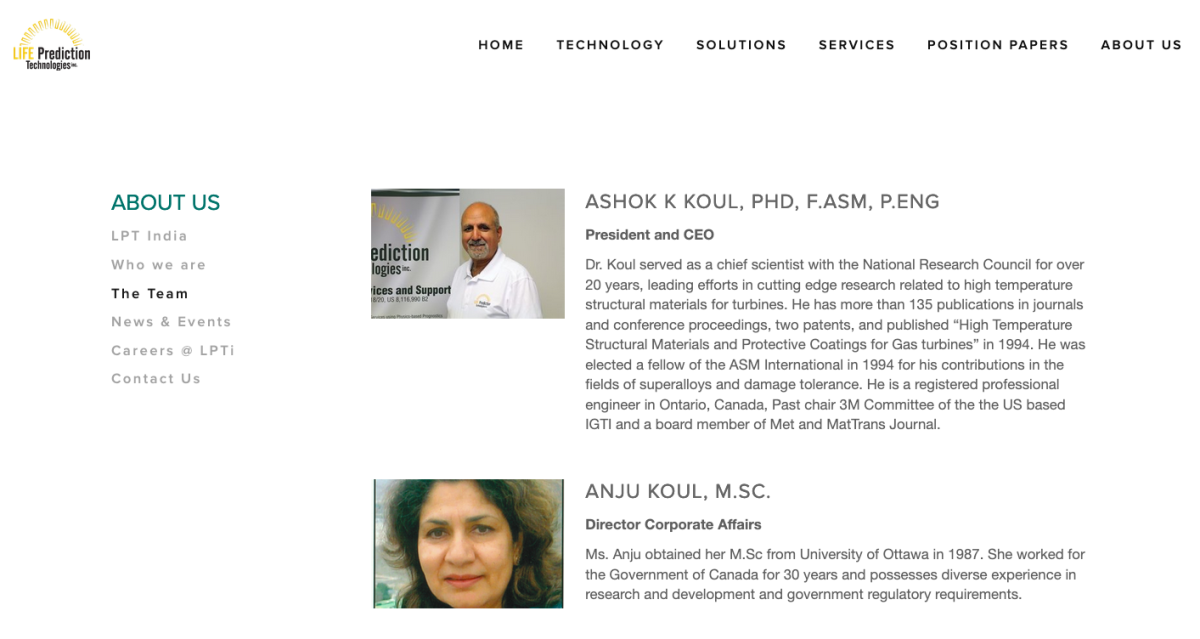DESIBUZZCanada
Events Listings
Dummy Post

International Day Of Yoga To Be Virtually Celebrated Saturday At 4pm

CANCELLED: Coronavirus Fears Kills Surrey’s Vaisakhi Day Parade

ADVERTISE WITH US: DESIBUZZCanada Is The Most Read South Asian Publication Online

SURREY LIBRARIES: Get Technology Help At Surrey Libraries

WALLY OPPAL: Surrey Police Transition Update On Feb. 26

GONE ARE THE DAYS - Feature Documentary Trailer

Technology Help At Surrey Libraries

Birding Walks

Plea Poetry/short Story : Youth Contest

International Folk Dancing Drop-in Sessions
Pro-India Canadian Government Contractor Who Was Given Millions For Work Barred After Alleged Contact With Indian Intelligence Officials
- February 7, 2020

Life Prediction Technologies Inc., an aerospace company operated by Ashok Koul, and his wife, Anju Koul, was contracted by the Canadian military as recently as 2018 but was recently removed from the government’s controlled goods program after the allegations of his meeting Indian intelligence officials came to light. “This investigation has determined that since approximately 2000, you have had consistent contact with the Indian High Commission in Ottawa, including elements of the Indian government involved in information and intelligence collection activities in Canada,” read the letter from Canadian authorities. The letter alleged that Ashok Koul had failed to report his contacts with foreign officials to the Canadian government and had provided “contradictory and misleading” answers to investigators.
OTTAWA – An Indo-Canadian government contractor who received millions in contract work from Ottawa has been barred from work related to the military or national security because of his alleged “consistent contact” with Indian intelligence officials.
Life Prediction Technologies Inc., an aerospace company operated by Ashok Koul, and his wife, Anju Koul, was contracted by the Canadian military as recently as 2018 but was recently removed from the government’s controlled goods program after the allegations of his meeting Indian intelligence officials came to light.
But many in the Indo-Canadian community are questioning why Ashok Koul was given the contracts in the first place given his clear pro-India stance as a longtime president of the Indo-Canadian Kashmir Forum, which supports the Indian government’s position in the disputed Kashmir region claimed by both India and Pakistan.
Following the alleged breaches of security, the Canadian government also revoked security clearances from Ashok Koul, a former National Research Council scientist, and his wife, Anju Koul, a former Health Canada biologist who owns half the business and is its director of corporate affairs.
Citing Koul’s alleged contacts with Indian officials, Canadian authorities deemed the company an undue risk of transferring controlled goods “to an unauthorized person,” documents show, reported Global News.
Details of the government action, and its link to Indian intelligence activities in Canada, were disclosed in documents filed in the Federal Court, where the company and the Kouls have launched an appeal.

The company’s lawyers could not be reached for comment. A company official told Global News the president was in India. Public Services and Procurement Canada also declined to comment on the case.
But in a letter explaining the decision to revoke Koul’s reliability status, the department said it had launched an investigation after receiving information from a “security partner.”
“This investigation has determined that since approximately 2000, you have had consistent contact with the Indian High Commission in Ottawa, including elements of the Indian government involved in information and intelligence collection activities in Canada,” it read.
The letter alleged that Ashok Koul had failed to report his contacts with foreign officials to the Canadian government and had provided “contradictory and misleading” answers to investigators.
In addition, the letter alleged he had been asked not to disclose “sensitive information about the background of a foreign government employee” but had “breached this trust” by telling the person in question.

“Therefore, a decision has been made to revoke your reliability status making you ineligible to maintain your Secret security clearance,” the public services department’s Canadian Industrial Security Directorate wrote.
Anju Koul received a similar letter alleging that although she had received government insider threat training, she had failed to report her “social contact” with foreign officials, specifically “elements of the Indian High Commission in Ottawa.”
“It was determined that you were aware that your company has an ongoing business contract with the Indian Government, specifically with the Ministry of Defence,” the letter, dated Dec. 31, 2018, further alleged.
In their Federal Court appeal, the Kouls called the government action unreasonable and argued they were never given enough information to meaningfully respond to the allegations.
The attorney general, meanwhile, has filed a case asking the court to prohibit the disclosure of two sensitive documents it argued “would be injurious to international relations, national security, or national defence.”
The company he founded in 1998 specializes in “predictive maintenance and life cycle management of gas turbines.” It serves the military and power-generation sector, according to its website, and has offices in the United States and India.
Government records show it was awarded a $1.1-million Canadian military contract in 2014 and another worth $655,000 in February 2018 — eight months before the president was informed his security clearance had been revoked.
Companies that deal in what the government calls controlled goods must register with federal authorities. Controlled goods are defined as those with “military or national security significance.”
After losing his security clearance, Ashok Koul resigned as chief security officer of the company, but on Nov. 21, 2018, Public Services and Procurement Canada ordered the business to stop work on a contract involving controlled goods.
Government staff later seized company files, it said, reported Global News.
Courtesy Global News

















